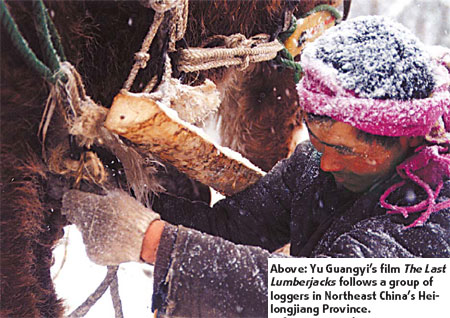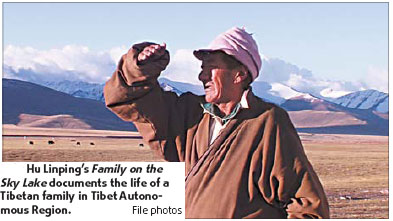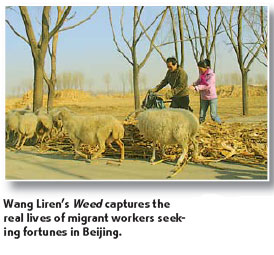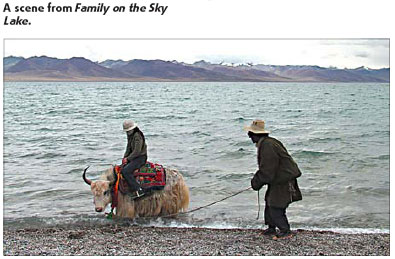Shooting for a few home truths


It was wee hours of a winter morning in Beijing in 2002 when Chinese independent filmmaker Wang Liren stepped out of the Lucky Bar after attending a rock show with friends. Still swept up with the energy of rock music and under the influence of a bit of alcohol, Wang sensed nothing beyond the freezing wind and the dim glow of the streetlamps.

Nothing seemed unusual until he saw a migrant-worker couple riding a pedicab loaded with four children along the silent Beijing roads. Another group of migrant construction workers shoveled in a waist-deep pit, while a group of wild-looking young punk rockers chatted above the hole.
"At first, it was the bleak and lonely buildings and roads that attracted me. Those pictures are still vivid in my mind today, appearing sad and ironic but real," Wang recalls. "They mirror the real lives of some people who are living - no, struggling - in Beijing. Reality is more theatrical than most films."
Four years later, those impressive and thought-provoking images resurfaced as the subject matter of Wang's debut film Weed. In the film, such real-life events provide the backdrop for the story of a migrant worker in the suburbs of Beijing who falls for a girl, even though all signs suggest her profession is not the most honorable.
Mayi, the protagonist in this strikingly stylized debut, is such a "new urban dweller". He works as a removal man for a company owned by a relative. In his spare time, he drinks and plays cards with his colleagues.
Soon, he finds an opportunity to move into the immediate vicinity of the beautiful Hudie. His obsession with her doesn't relent, even when it becomes clear that she receives numerous male visitors.

Pursuing his desires and ambitions means telling seemingly innocuous white lies, with dramatic consequences. The story, which in many ways resembles Kieslowski's A Short Story About Love, is set in 2003, when the country was gripped by the SARS panic.
Weed, which was filmed entirely in Beijing, captures the real lives of migrant workers seeking fortunes in the big city. With skillful camerawork and a dramatic narrative, Wang created a wonderful visual collage of old and new Beijing, and chronicles the clashes between the city's upper-class and underclass. The migrant workers cram inside dilapidated hutong alleyways, while money-grubbing bosses cruise Beijing highways in Mercedes-Benzes and reside in the glitzy, new structures sprouting up around the city.
"Museums, hutong and the Forbidden City's high walls as well as modern skyscrapers and fancy, Western-styled restaurants coexist to a nearly equal degree in Beijing, a city which is so generous to absorb cultures from around the world," Wang says. "Migrant workers, who are contributing to the city, seem to be a relatively weak colony. They have the same desires as all human beings but they, because of their brutal living environments, must bear depression."
Many independent Chinese filmmakers in recent years have been said to create "the cinema of reality". The genre delves into the great changes and social transformations underway, and its main characters are often farmers whose family bonds are replaced with entirely different social structures when they relocate to cities.
The theme is nothing new to Chinese cinematography. But 35-year-old Wang offers a fresh and distinctive approach, which examines the most current, tremendous transformations reshaping Beijing today.
Weed looks at the sharp contrast between dreams and reality. It was produced with a grant from The Hubert Bals Fund of the International Film Festival Rotterdam 2007 and will compete at the 3rd Asian Festival of 1st Films (AFFF), which runs from Tuesday to December 4 in Singapore.
Founded to promote first-time filmmakers of Asia-Pacific origin under the Asia Media Festival 2007, AFFF - hosted by the Media Development Authority of Singapore (MDA) - showcases first-time documentaries and films. Twenty-one films and documentaries have been selected for this year's festival across nine award categories.
In addition to Weed, two documentaries from the Chinese mainland - Hu Linping's Family on the Sky Lake and Yu Guangyi's The Last Lumberjacks - made the nomination list.
Hu's Family on the Sky Lake records the life of Siba and his family in today's Tibet Autonomous Region. Many herdsmen's lives are changing there, especially with the completion of the Qinghai-Tibet railway.
This documentary shows the dual lives many now live - that of the nomad and that of the tourism businessperson. The film begs the question: With the changes that would come with future development, how much longer can the people of Tibet maintain their traditional lifestyles?
First-time filmmaker Yu Guangyi's film The Last Lumberjacks draws on personal experience. It's a touching yet honest portrait of a group of loggers in Northeast China's Heilongjiang Province, and to Yu, "It is like a dream which has been lingering in my heart". Lumberjacks in this mountainous part of China use tree-felling methods that have remained unchanged for centuries.
With their small but strong horses and sleds, they transport massive logs across the province's wintry landscape. The Last Lumberjacks follows a group of loggers during their last winter on a mountain.
In 90 minutes, without comment, the film demonstrates what a grueling life they lead. The men live in humble cabins, where they eat, drink wine and sleep. They rise at the crack of dawn, harness their horses and trek up the mountainside. In the forest, they cut trees and transport the logs downhill to the sawmill.
The landscape is inhospitable. Trails are steep and made slippery by constantly falling snow. And the logs are unwieldy and hard to manage. Occasionally, the loggers perform rituals to placate the mountain god, because their work is so dangerous.
This would be the last year for these lumberjacks to work on the mountainside, because there's not enough timber left to harvest.
In the spring, they would break camp and leave to find work in the city. "I was born and grew up in the forests of Heilongjiang Province," Yu says. "Many people in the film are my childhood friends. We went to the place where loggers live and listened to their old but interesting stories, which was the most enjoyable part.
In 2004, after being gone for 20 years, Yu returned to the province's forests to film his first documentary. He says shooting the film was like walking through a time tunnel, and he even cried.
"They moved me deeply, and I want to record their lives," he says.
According to Yu, the film records the most basic state of being and desire of humans living amidst ice and snow, and documents a mode of production and lifestyle that is disappearing for the sake of civilization's progress.
Two films from Taiwan - both coming-of-age stories - are also competing in this year's AFFF. Pan Zhi-yuan's A Touch of Fate is a human drama about a lost teenager and his estranged family. The film unfolds around 15-year-old Da Yu, a troublemaker at school who befriends a light-fingered man named Lee. Cheng Fen-Fen's Keeping Watch centers around a boy, a girl and the past that comes between them.
Celebrated Hong Kong director Gordon Chan, who served as a member of the selection committee, said: "I was really impressed by the works of this new breed of directors and filmmakers. They have already attained a quite high standard with their first films; that means experienced people like me should go back and learn some more tricks to keep up with the new talent. It's almost scary."
A growing number of Chinese independent filmmakers are exploring their creative potential and spurring a stronger domestic film industry. And rising filmmakers are finding their hometowns to be treasure troves, which they can use to create cinematic gems.
"As a director, I am very aware of what's happening around me - the reality of it. I am more reflective about the present, always trying figure out how people are caught up in their whirlwinds of events," Wang says. "There's an endless supply of good stories around the place where I live.
"I want people to feel the pulse of the country undergoing sweeping changes," he says.
(China Daily 11/29/2007 page18)














